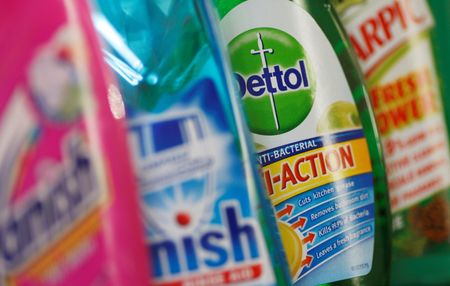By Richa Naidu
LONDON (Reuters) -Reckitt Benckiser, maker of Dettol cleaning products and Durex condoms, on Wednesday reported a decline in sales volumes in the third quarter and warned of pressure on consumers globally.
Reckitt and other consumer goods companies, from Procter & Gamble to Nestle, are hiking prices this year, enabling them to partially pass record energy and supply chain cost increases on to shoppers.
But analysts and executives are uncertain how long consumers will be able to stomach the price rises.
“Consumers across the globe are under pressure. Certainly, looking at the outlook, I’m concerned about European consumers over the winter,” Reckitt’s finance chief Jeff Carr told journalists. “Having said that, there’s no real differentiation at the moment between Europe and the U.S.”
Reckitt’s shares were down 4% in early trading.
The company is seeing “unprecendented” cost of goods inflation of almost 20% in the second half of the year, Carr said.
“The peak of pricing and commodities will be the second half of this year,” he added, saying supply chain cost inflation is starting to come down. He pointed specifically to crude oil and ocean freight, which peaked this year.
“As I look to 2023, labour inflation is going to be a bigger issue.”
Despite those pressures, Reckitt now expects like-for-like sales growth of 6%-8% in 2022, compared with its previous guidance of 5%-8%.
The industry’s higher prices, which are contributing to a global cost-of-living crisis, are denting sales volumes as many people cut down on non-essential items and turn to cheaper or private label products. But, so far, falling demand, has been offset by price increases.
“Clearly consumers are buying a little less in more discretionary categories,” Carr said, flagging that sales volumes had declined in the supplements, vitamins and air freshener categories.
TARGETS MARGIN GROWTH
Reckitt, whose products also include Lysol cleaning products and Strepsils throat lozenges, said it continues to target growth in adjusted operating margins.
Net revenue growth benefited from increased demand for infant formula in the United States due to a temporary shortage, prompted by rival Abbott Laboratories recalling products in February. Carr said Reckitt expects the market to be “fully back to normal” by the end of the year.
The company’s third-quarter like-for-like revenue rose 7.4%, above the 6.1% growth analysts had expected in a company-supplied poll.
“That beat is largely due to infant nutrition, where they still benefited from Abbott product withdrawal,” Bernstein analyst Bruno Monteyne said. “Without that benefit, organic would have been about 4%, which isn’t all that great if you keep in mind that they have double-digit pricing in all divisions.”
Sales volumes declined 4.6%. Excluding Lysol sales, which were boosted by Covid-19 this time last year, they declined 1%.
“The drop in hygiene product volumes was worse than expected and there are a lot of one-offs that make underlying trends difficult to extrapolate to 2023,” Tineke Frikkee, a fund manager at Reckitt investor Waverton Asset Management, said.
“Costs are also still very high, running at high teens. Once all these one-offs are excluded, some sell-side analysts believe underlying sales growth is far more modest and close to the bottom end of medium-term sales growth guidance.”
(Reporting by Richa Naidu, Editing by Louise Heavens and Matt Scuffham)

